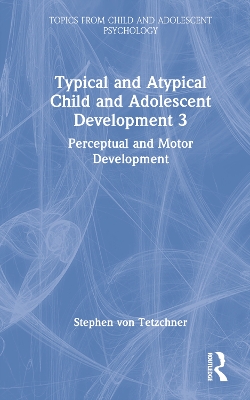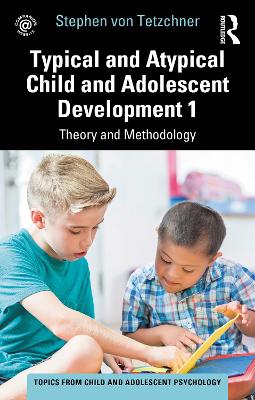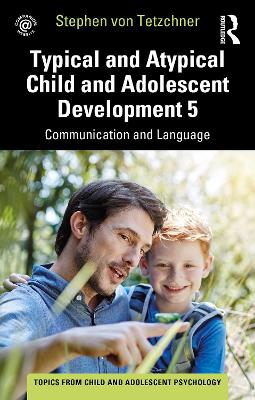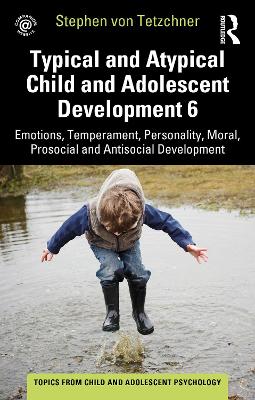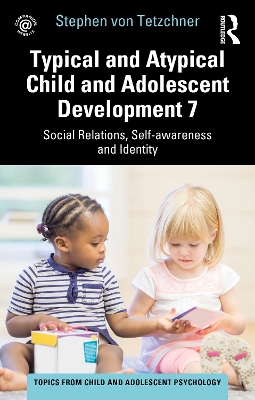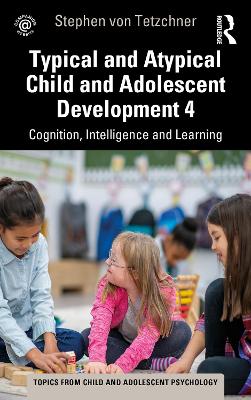Topics from Child and Adolescent Psychology
7 total works
Typical and Atypical Child Development 3 Perceptual and Motor Development
by Stephen von Tetzchner
This concise guide offers an accessible introduction to perceptual development and motor development from infancy to adolescence. It integrates insights from typical and atypical development to reveal fundamental aspects of human growth and development, and common developmental disorders.
The topic books in this series draw on international research in the field and are informed by biological, social and cultural perspectives, offering explanations of developmental phenomena with a focus on how children and adolescents at different ages actually think, feel and act. In this succinct volume, Stephen von Tetzchner covers key topics in perceptual development including: the theory of perceptual development, early and later development of vision, visual impairment, early perception of sound, the development of hearing throughout childhood and adolescence, the development of musical skills, hearing impairment, deafblindness, smell and taste. The section on motor development explores: theories of motor development, gross motor development, fine motor skills and atypical motor development.
Together with a companion website that offers topic-based quizzes, lecturer PowerPoint slides and sample essay questions, Typical and Atypical Child and Adolescent Development 3: Perceptual and Motor Development is an essential text for all students of developmental psychology, as well as those working in the fields of child development, developmental disabilities and special education.
Typical and Atypical Child and Adolescent Development 1 Theory and Methodology
by Stephen von Tetzchner
This concise guide offers an accessible introduction to the key theoretical perspectives and methodologies in developmental psychology. It integrates insights from typical and atypical development to reveal fundamental aspects of human growth and development, and common developmental disorders.
The topic books in this series draw on international research in the field and are informed by biological, social and cultural perspectives, offering explanations of developmental phenomena with a focus on how children and adolescents at different ages actually think, feel and act. In this succinct volume, Stephen von Tetzchner outlines the main theoretical perspectives including psychodynamic psychology, behaviorism, logical constructivism, social constructivism, evolutionary psychology, ethological psychology, ecological psychology, information processing and critical developmental psychology. He provides a guide to methods of gaining knowledge about children and introduces child and adolescent disorders.
Together with a companion website that offers topic-based quizzes, lecturer PowerPoint slides and sample essay questions, Typical and Atypical Child and Adolescent Development 1: Theory and Methodology is an essential text for all students of developmental psychology, as well as those working in the fields of child development, developmental disabilities and special education.
The content of this topic book is taken from Stephen von Tetzchner’s core textbook Child and Adolescent Psychology: Typical and Atypical Development. The comprehensive volume offers a complete overview of child and adolescent development. For more information visit www.routledge.com/9781138823396
Typical and Atypical Child and Adolescent Development 5 Communication and Language Development
by Stephen von Tetzchner
This concise guide offers an accessible introduction to the development of communication and language in infancy and childhood. It integrates insights from both typical and atypical development to reveal the fundamental aspects of human growth and development, and common developmental disorders.
The topic books in this series draw on international research in the field and are informed by biological, social and cultural perspectives, offering explanations of developmental phenomena with a focus on how children and adolescents at different ages actually think, feel and act. In this volume, Stephen von Tetzchner explains key topics including: Language and Communication; early development of communication; theories of communicative development; early dialogues; gestures; the development of language; language in use; child-directed language; gender differences multilingualism and language in other modalities; and language disorders.
Together with a companion website that offers topic-based quizzes, lecturer PowerPoint slides and sample essay questions, Typical and Atypical Child and Adolescent Development 5 Communication and Language Development is an essential text for all students of developmental psychology, as well as those working in the fields of child development, developmental disabilities and special education.
The content of this topic book is taken from Stephen von Tetzchner’s core textbook Child and Adolescent Psychology: Typical and Atypical Development. The comprehensive volume offers a complete overview of child and adolescent development – for more information visit www.routledge.com/9781138823396
This concise guide offers an accessible introduction to emotions, temperament, personality, moral, prosocial and antisocial development in childhood and adolescence. It integrates insights from both typical and atypical development to reveal the fundamental aspects of human growth and development, and common developmental disorders.
The topic books in this series draw on international research in the field and are informed by biological, social and cultural perspectives, offering explanations of developmental phenomena with a focus on how children and adolescents at different ages actually think, feel and act. In this volume, Stephen von Tetzchner explains key topics including: Emotions and emotion regulation; temperament and personality; moral development; prosocial and antisocial development
Together with a companion website that offers topic-based quizzes, lecturer PowerPoint slides and sample essay questions, Typical and Atypical Child and Adolescent Development 6 Emotions, Temperament, Personality, Moral, Prosocial and Antisocial Development is an essential text for all students of developmental psychology, as well as those working in the fields of child development, developmental disabilities and special education.
The content of this topic book is taken from Stephen von Tetzchner’s core textbook Child and Adolescent Psychology: Typical and Atypical Development. The comprehensive volume offers a complete overview of child and adolescent development – for more information visit www.routledge.com/9781138823396
Typical and Atypical Child and Adolescent Development 7 Social Relations, Self-awareness and Identity
by Stephen von Tetzchner
This concise guide offers an accessible introduction to social development, social relations, identity development and self-awareness from childhood to adolescence. It integrates insights from both typical and atypical development to reveal the fundamental aspects of human growth and development, and common developmental disorders.
The topic books in this series draw on international research in the field and are informed by biological, social and cultural perspectives, offering explanations of developmental phenomena with a focus on how children and adolescents at different ages actually think, feel and act. In this volume, Stephen von Tetzchner explains key topics including: Attachment; sibling and peer relations; self and identity; gender development; play; media and understanding of society; and the transition toward adulthood.
Together with a companion website that offers topic-based quizzes, lecturer PowerPoint slides and sample essay questions, Typical and Atypical Child and Adolescent Development 7 Social Relations, Self-awareness and Identity is an essential text for all students of developmental psychology, as well as those working in the fields of child development, developmental disabilities and special education.
The content of this topic book is taken from Stephen von Tetzchner’s core textbook Child and Adolescent Psychology: Typical and Atypical Development. The comprehensive volume offers a complete overview of child and adolescent development – for more information visit www.routledge.com/9781138823396
This concise guide offers an accessible introduction to genes, fetal development and early brain development. It integrates insights from typical and atypical development to reveal fundamental aspects of human growth and development, and common developmental disorders.
The topic books in this series draw on international research in the field and are informed by biological, social and cultural perspectives, offering explanations of developmental phenomena with a focus on how children and adolescents at different ages actually think, feel and act. In this succinct volume, Stephen von Tetzchner explains key topics including: Genetic inheritance, evolution, heredity and environment in individual differences, fetal development, prenatal stimulation, methods of studying the brain, brain development, early and later plasticity and brain organization and atypical development.
Together with a companion website that offers topic-based quizzes, lecturer PowerPoint slides and sample essay questions, Typical and Atypical Child and Adolescent Development 2: Genes, Fetal Development and Early Neurological Development is an essential text for all students of developmental psychology, as well as those working in the fields of child development, developmental disabilities and special education.
Typical and Atypical Child Development 4 Cognition, Intelligence and Learning
by Stephen von Tetzchner
This concise guide offers an accessible introduction to cognitive development in childhood and adolescence. It integrates insights from typical and atypical development to reveal fundamental aspects of human growth and development, and common developmental disorders.
The topic books in this series draw on international research in the field and are informed by biological, social and cultural perspectives, offering explanations of developmental phenomena with a focus on how children and adolescents at different ages actually think, feel and act. In this volume, Stephen von Tetzchner explains key topics including: theories of cognitive development; attention, memory and executive function; conceptual development and reasoning, theory of mind; intelligence; and learning and instruction..
Together with a companion website that offers topic-based quizzes, lecturer PowerPoint slides and sample essay questions, Typical and Atypical Child and Adolescent Development 4 Cognition, Intelligence and Learning is an essential text for all students of developmental psychology, as well as those working in the fields of child development, developmental disabilities and special education.
The content of this topic book is taken from Stephen von Tetzchner’s core textbook Child and Adolescent Psychology: Typical and Atypical Development. The comprehensive volume offers a complete overview of child and adolescent development – for more information visit www.routledge.com/9781138823396
